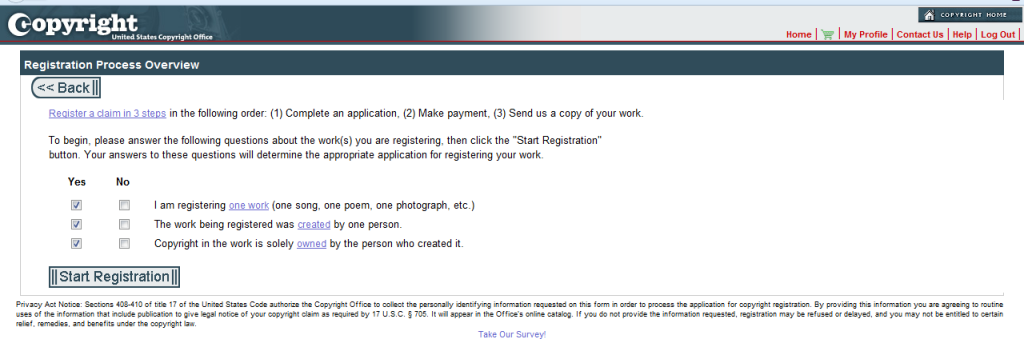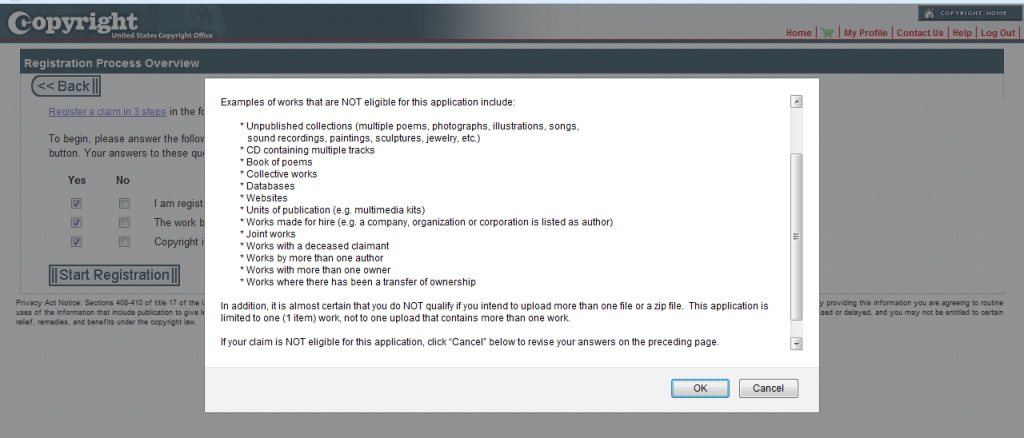Yesterday, May 1, 2014, the Copyright Office raised most of its fees. There was one fee that didn’t go up for a subset of claimants, though, those that are for registration of “single author, same claimant, one work, not for hire.”
So it’s the “not for hire” part that gives me pause. The Copyright Office’s motives are pure:
The Office is also proposing to offer a reduced fee to a single author who is also the claimant for the online filing of a claim in a single work that is not a work made for hire, for the policy reasons discussed below and after considering the comments received from the public in response to the January 24, 2012 Notice of Inquiry. The Copyright Office is committed to maintaining an affordable copyright registration system. No author or copyright owner should be deterred from registering a copyright because the cost of registration is too high, and the Office is mindful that there is not endless elasticity in pricing; pricing is a factor in whether one chooses to register. Many of the works that come from independent creators are critical to the Nation’s economy and the Library of Congress’ mint record and collection of American creativity. The copyright law itself is designed to promote and protect authorship and this includes facilitating registration for the establishment of a public record of copyright claims and to enable the copyright owner to seek all the remedies available in the Copyright Act. Similarly, users of copyrighted works rely on the Copyright Office registration records to identify copyright owners when they require licenses. If individual authors do not register and are therefore not part of the public database, they more than any other group of copyright owners may be difficult to find.
Commenters to the Notice of Inquiry support a separate and lower fee for single authors. They note, as did the Office, that such applications are easier to process; that registration provides important remedies for the author; and that registration benefits the public by creating a more robust public record. The Office therefore sees a clear benefit to offering a lower fee to these claimants as an incentive to register their works.
Indeed laudable. Here’s how it looks during the electronic registration process:

If you can’t read the text, it has three criteria, all of which must be selected as “Yes” to get the reduced fee:
I am registering one work (one song, one poem, one photograph, etc.)
The work being registered was created by one person.
Copyright in the work is solely owned by the person who created it.
If you say “yes” to all of there, there is another warning before you can continue:

This says:
IMPORTANT NOTICE:
WARNING: Using the application to file a claim that does not meet all of the criteria below may result in processing delays, additional fees, and later effective date of registration.
Examples of works that are NOT eligible for this application include:
* Unpublished collections (multiple poems, photographs, illustrations, songs, sound recordings, paintings, sculptures, jewelry, etc.)
* CD containing multiple tracks
* Book of poems
* Collective works
* Databases
* Websites
* Units of publication (e.g. multimedia kits)
* Works made for hire (e.g. a company, organization or corporation is listed as author)
* Joint works
* Works with a deceased claimant
* Works by more than one author
* Works with more than one owner
* Works where there has been a transfer of ownershipIf your claim is NOT eligible for this application, click “Cancel” below to revise your answers on the preceding page.
If you claim satisfies all of the criteria listed above, click “OK” below.
Now, the registration process for all applications requires that the claimant state whether or not the work is a work made for hire, so you could say that the only difference is that the decision point for this judgment call is simply made earlier in the registration process. And I’ll even say that the added questions are more likely to lead to a correct answer on whether the work is a work made for hire than the simple “yes/no” check boxes on the main form. But the answer has a different consequence than before; now saying “no” means that the fee is reduced.
Time after time we see litigation about who the copyright owner is. It matters because only the owner of an exclusive legal or beneficial right has standing for a copyright infringement claim. So ownership is a frequent point of challenge; if you can show that the registration was in the wrong name then the whole lawsuit gets dismissed.
Now lets take the example of an individual creator who has a business entity, say an LLC. This is a notoriously difficult situation in which to sort out ownership. In the 9th Circuit case Jules Jordan Video, Inc. v. 144942 Canada Inc., No. 08-55075, 08-55126 (9th Cir. Aug. 16, 2010) (blogged here), the sole shareholder of the corporation, Ashley Gasper, was the producer, director and star of porno films. The district court decided that Gasper’s work on the films was as a work made for hire but the 9th Circuit reversed.
So with the new fees you will get sole shareholders or members who may not have a clear understanding of the legal dividing lines between acts of the owner and acts of the employee, or who are motivated to list themselves individually as owner because it’s less expensive. The ownership then gets challenged in litigation—okay, but that was already happening anyway, so what?
The difference is the reduced fee. Under 17 U.S.C. § 411(b), an error in a registration certificate does not invalidate a registration unless the applicant knew that the information was inaccurate and “the inaccuracy of the information, if known, would have caused the Register of Copyrights to refuse the registration.” Certainly it’s arguable that the Copyright Office would have refused registration because the proper fee wasn’t paid.
Hopefully the Register of Copyrights will help out the erring registrants, though. 17 U.S.C. § 411(b) also says that courts have to ask the Copyright Office to opine on whether the error would have refused registration, so maybe the Copyright Office will find a clever solution.

Leave a Reply